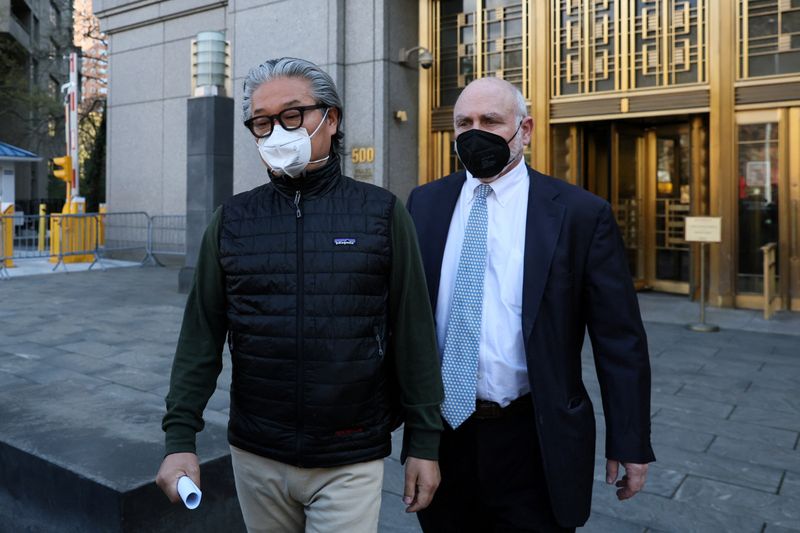By Tatiana Bautzer and Michelle Price
NEW YORK (Reuters) -Attorneys for Sung Kook “Bill” Hwang are expected to argue that prosecutors are pushing a novel and nonsensical market manipulation theory when the criminal trial of the former Archegos Capital Management boss kicks off in New York this month.
Archegos, a $36 billion family office which invested Hwang's personal wealth, collapsed spectacularly in March 2021 after its highly leveraged bets on a small number of stocks via complex derivatives quickly soured.
Prosecutors allege Hwang and his deputies lied to banks about the magnitude of Archegos' derivative positions to borrow billions of dollars that they then used to inflate the underlying stocks through open market purchases.
When Archegos finally ran out of money in March 2021, Hwang's "house of cards" collapsed, prosecutors for the Southern District of New York allege.
The fund's blow up, one of the biggest in years, left global banks nursing $10 billion in losses, including $5.5 billion at Credit Suisse, contributing to the Swiss bank's own downfall last year. Prosecutors also allege Archegos' collapse caused more than $100 billion in shareholder losses at companies in its portfolio.
The trial, which begins with jury selection on Wednesday, is expected to lift the lid on the inner workings of Wall Street and banks' dealings with profitable but risky clients.
"This case has generated particular attention on Wall Street because banks, including Credit Suisse, lost billions of dollars as a result of Hwang’s alleged scheme," said Joshua Naftalis, a former prosecutor and now partner at law firm Pallas.
Hwang, a former hedge fund manager who was known on Wall Street for his highly risky investing style, has pleaded not guilty and denies all the charges. In a December court filing, his attorneys said that it was the "most aggressive open market manipulation case ever" brought by prosecutors.
Several attorneys said they believe it may be a tough case for prosecutors to win because the market manipulation theory is untested, and the Wall Street banks are not typical victims.
"You could definitely say the prosecutors are pushing the envelope here," said Brian Klein, a former federal prosecutor who is now a partner at law firm Waymaker.
Typically, market manipulation involves some kind of trickery, but the stock purchases Archegos made in the open market do not appear to involve deception, said Robert Frenchman, an attorney who has defended clients in market manipulation cases.
"The defense will argue that those buys were bona fide," he added.
A spokesperson for the prosecution declined to comment. Hwang's defense attorneys also declined to comment.
The son of a Korean pastor, Hwang moved to the United States as a child and earned several U.S. business degrees.
He honed his stock-picking skills from 1996 to 2000 at Tiger Management, the late billionaire Julian Robertson’s pioneering hedge fund. In 2001, Hwang launched his own hedge fund business, Tiger Asia Management.
The fund grew quickly, but then losses and regulatory issues in Hong Kong and the United States led the firm to shut in 2012. Hwang paid $44 million to settle U.S. insider trading charges.
Hwang turned Tiger Asia into a family office, renaming it Archegos Capital Management in early 2013. Reuters reported in 2021 how Hwang rebuilt his connections on Wall Street.
His trial is expected to last up to eight weeks, suggesting many witnesses will be called. Among them will likely be former Archegos chief risk officer Scott Becker and head trader William Tomita, who pleaded guilty to lying to the banks and are cooperating with prosecutors.
Executives from some of the banks are also expected to appear.

Given the banks are sophisticated financial institutions, prosecutors may struggle to characterize them as sympathetic victims, said lawyers.
"The defense will probably argue these facts were hiding in plain sight and the banks were aware of what Hwang was doing," said Naftalis.